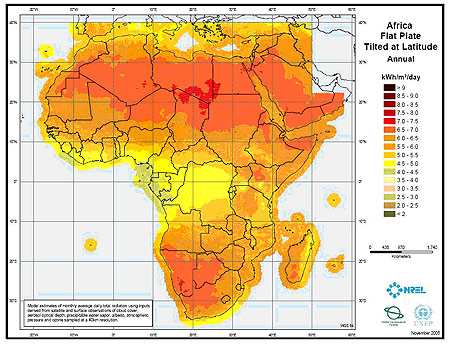As a native of Kenya, I am fortunate to have personal experience of how renewable energy can transform a country that is developing fast.
Energy sources in Kenya have diversified since 2000, when renewable power capacity contributed 5.4 per cent of the country’s total energy mix. By 2012, this figure had grown to 16.2 per cent.
With smart planning and prudent investment, all African countries can reduce their dependence on fossil fuels and leapfrog into a sustainable future. And, as Africa makes the transition to renewable energy in the coming years, new projects will provide much-needed jobs and power economic growth.
Africa is blessed with plentiful land and natural resources. Prodigious sunshine blankets the continent for much of the year, ideal conditions for solar power. Hot rocks in areas such as the Rift Valley store geothermal energy. Vast plains and mountain ranges are great sites for wind turbines while mighty rivers like the Zambezi can be harnessed for hydropower projects. Finally, biomass is abundant – all providing multiple opportunities for renewable energy production.
This vast potential in Africa can be realised with effective cooperation and successful projects that cross borders. This will help the world to triple its production of renewable energy by 2050 and avoid catastrophic climate change. Just as importantly, this is all possible while taking the continent to new levels of prosperity.
With its population expected to reach two billion by 2050, Africa is at a crossroads.
Africa will need another 250 gigawatts of capacity between now and 2030 to meet the demands of its quickly growing populations and economies.
It can either power its surging growth with fossil fuels, which would put the world on an unsustainable path to climate change, or it can fuel development with vast renewable energy resources.
The solution to providing that energy and keeping prices in check is to tap into Africa’s clean, reliable, indigenous, affordable and abundant renewable energy sources. Renewables present an economically and environmentally beneficial framework to power the continent’s growth.
Scaling-up African energy infrastructure to accommodate the growing energy demand is necessary, but scaling it up in a smart way to include more renewable energy in the energy mix is paramount.
That’s why the International Renewable Energy Agency (Irena) is working with 21 African countries on the Africa Clean Energy Corridor.
Irena’s initiative encourages the deployment of hydro, geothermal, biomass, wind and solar options from Cairo to Cape Town to increase capacity, stabilise the grid, and reduce fossil fuel dependency. It is a regional approach, promoting international cooperation across countries of the eastern and southern African power pools to develop vast energy resources, optimise the energy mix and attract more investment. The plan identifies development zones to cluster renewable plants in areas with high potential, resource planning, new financing models and knowledge and capacity building.
This week, as we convene for the Abu Dhabi Ascent, we are welcoming many African ministers who have engaged with us on this project.
The Africa Clean Energy Corridor is one of the many concrete steps needed that offer a cost-effective, economically viable solution to the climate challenge that lies ahead of us.
With the right combination of policy, investment and rapid deployment, we can make substantial progress in decarbonising the world’s energy mix while generating growth and employment.
Until now, Africa’s growth has mostly been powered by fossil fuels. African countries now have the opportunity to continue their growth and to thrive and emerge with confidence and prosperity in a cleaner way than ever.
Is renewable energy only for rich countries? Absolutely not – with good planning and intelligent frameworks for international cooperation, Africa is working hard to prove this stereotype wrong, once and for all.
Adnan Amin is director-general of the International Renewable Energy Agency


